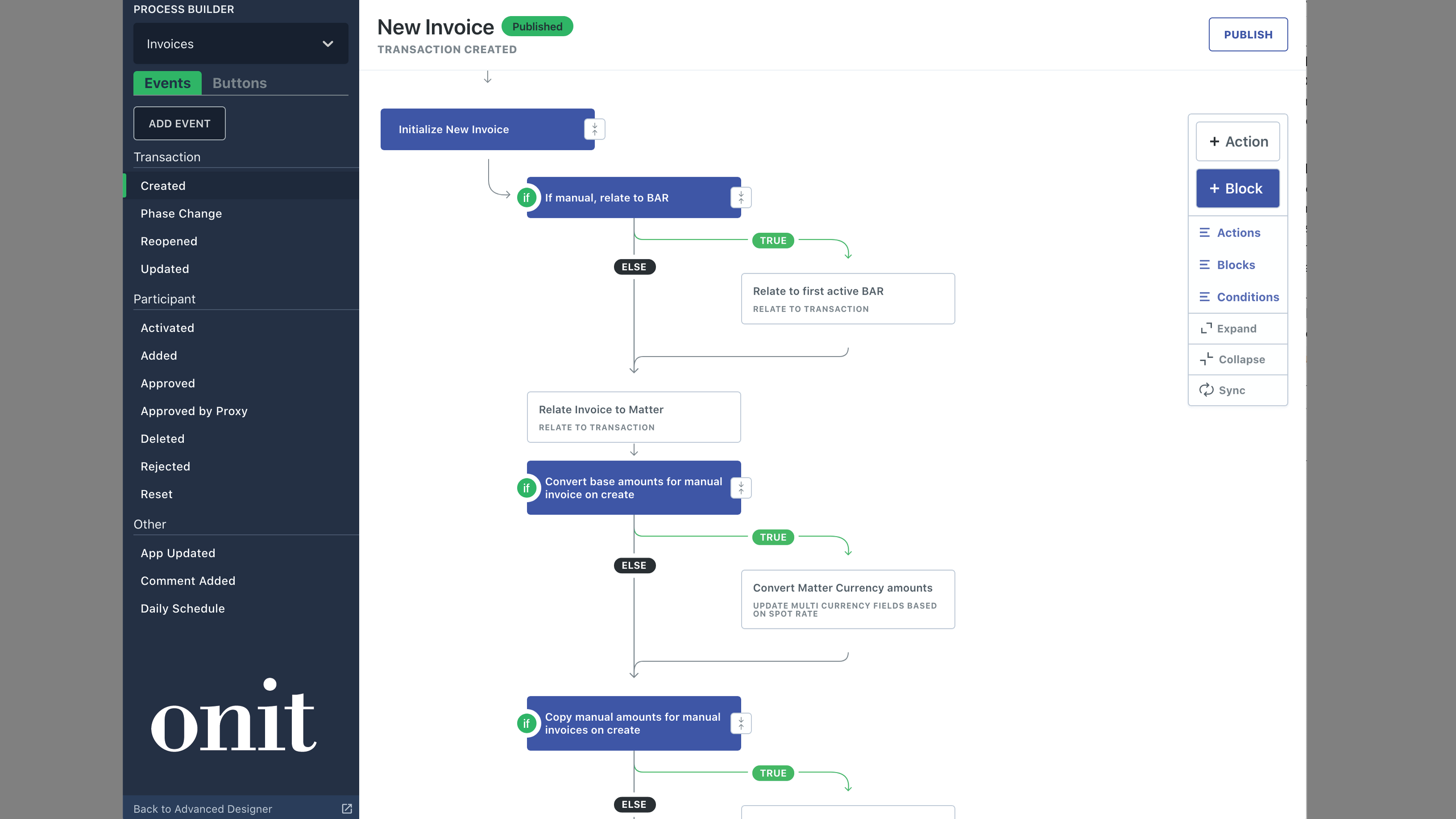
Onit Unity ELM Platform: Complete Buyer's Guide
AI-native approach to enterprise legal management
Onit Unity ELM Platform represents an AI-native approach to enterprise legal management that unifies matter management, vendor operations, and financial oversight under a single comprehensive platform architecture.
Market Position & Maturity
Market Standing
Onit Unity ELM Platform holds a Leader position in the IDC MarketScape for Worldwide Enterprise Legal Management Software (August 2023) [56], validating its competitive standing among established enterprise legal technology providers.
Company Maturity
Onit's strategic expansion through acquisitions demonstrates operational sophistication and growth trajectory. The Legal Files Software acquisition brought 500+ additional customers spanning corporate enterprises, insurance companies, and federal, state, and municipal governments [48].
Growth Trajectory
The platform's AI-native architecture positions Onit ahead of competitors retrofitting AI capabilities onto existing platforms [50]. Unity's Agent Studio and dedicated AI agents represent technological advancement beyond traditional ELM vendors.
Industry Recognition
Beyond IDC MarketScape leadership recognition [56], Onit demonstrates market validation through enterprise customer adoption including Fortune 500 companies like PayPal and The Home Depot [41][43].
Strategic Partnerships
Unity leverages Workato's iPaaS technology for enterprise integrations [44][56], demonstrating strategic technology partnerships that enhance platform capabilities.
Longevity Assessment
Onit's market position as an IDC MarketScape Leader [56], combined with its 3,000+ global customer base [43][45] and strategic acquisition activity [48], indicates strong business fundamentals and long-term viability.
Proof of Capabilities
Customer Evidence
Unity demonstrates proven capabilities through Fortune 500 implementations including PayPal, The Home Depot, Under Armour, and ADM [41][43].
Quantified Outcomes
The Home Depot migrated 12+ years of e-billing data and onboarded 300+ firms in 150 days [43]. Under Armour established complete legal spend management in 180 days [43].
Case Study Analysis
The Fortune 500 NDA App processed over 1,000 NDAs in the first month with 95% time reduction (24 hours vs. 16-day average) and 90% processed without lawyer involvement [57].
Market Validation
Onit serves over 3,000 customers across 175+ countries [43][45], with documented revenue concentration from companies with $1 billion+ revenues [43].
Competitive Wins
Unity's 150-180 day implementation timelines contrast with industry-standard 9-12 month ELM deployments [43], providing measurable competitive advantage.
Reference Customers
Unity's customer base spans diverse industries through its expanded portfolio, including corporate enterprises, insurance companies, and federal, state, and municipal governments [48].
AI Technology
Unity's AI-native architecture centers on its AI Agent Studio, which introduces dedicated AI agents for matter, spend, request, and contract management [46][50].
Architecture
Unity leverages Workato's iPaaS technology for integrations with Salesforce, SAP Ariba, Microsoft 365, and Oracle [44][56]. The platform's API-first architecture supports hundreds of prebuilt integrations while enabling custom development through its no-code Workflow Studio [44][46].
Primary Competitors
Unity competes against established ELM vendors including Thomson Reuters, IBM, and LexisNexis [1][3][14][28], as well as specialized AI-native platforms like Syllo, Kira Systems, and Genie AI [11][18][20][37][38].
Competitive Advantages
Unity's AI-native architecture and dedicated AI agents differentiate from traditional ELM vendors retrofitting AI capabilities onto existing platforms [50].
Market Positioning
Unity positions itself as the AI-first future of legal operations [50], targeting enterprise legal departments with billion-dollar company revenues [43].
Win/Loss Scenarios
Unity wins when organizations require comprehensive legal operations unification, sophisticated AI capabilities, rapid implementation with extensive vendor support, and complex integration requirements across multiple business systems.
Key Features

Pros & Cons
Use Cases
Integrations
Featured In Articles
Comprehensive analysis of AI Legal Project Management for Legal/Law Firm AI Tools for Legal/Law Firm AI Tools professionals. Expert evaluation of features, pricing, and implementation.
How We Researched This Guide
About This Guide: This comprehensive analysis is based on extensive competitive intelligence and real-world implementation data from leading AI vendors. StayModern updates this guide quarterly to reflect market developments and vendor performance changes.
58+ verified sources per analysis including official documentation, customer reviews, analyst reports, and industry publications.
- • Vendor documentation & whitepapers
- • Customer testimonials & case studies
- • Third-party analyst assessments
- • Industry benchmarking reports
Standardized assessment framework across 8 key dimensions for objective comparison.
- • Technology capabilities & architecture
- • Market position & customer evidence
- • Implementation experience & support
- • Pricing value & competitive position
Research is refreshed every 90 days to capture market changes and new vendor capabilities.
- • New product releases & features
- • Market positioning changes
- • Customer feedback integration
- • Competitive landscape shifts
Every claim is source-linked with direct citations to original materials for verification.
- • Clickable citation links
- • Original source attribution
- • Date stamps for currency
- • Quality score validation
Analysis follows systematic research protocols with consistent evaluation frameworks.
- • Standardized assessment criteria
- • Multi-source verification process
- • Consistent evaluation methodology
- • Quality assurance protocols
Buyer-focused analysis with transparent methodology and factual accuracy commitment.
- • Objective comparative analysis
- • Transparent research methodology
- • Factual accuracy commitment
- • Continuous quality improvement
Quality Commitment: If you find any inaccuracies in our analysis on this page, please contact us at research@staymodern.ai. We're committed to maintaining the highest standards of research integrity and will investigate and correct any issues promptly.